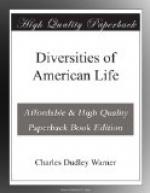a person’s highest satisfaction depends not
upon his exterior acquisitions, but upon what he himself
is. There is no escape from this conclusion.
The physical satisfactions are limited and fallacious,
the intellectual and moral satisfactions are unlimited.
In the last analysis, a man has to live with himself,
to be his own companion, and in the last resort the
question is, what can he get out of himself.
In the end, his life is worth just what he has become.
And I need not say that the mistake commonly made is
as to relative values,—that the things
of sense are as important as the things of the mind.
You make that mistake when you devote your best energies
to your possession of material substance, and neglect
the enlargement, the training, the enrichment of the
mind. You make the same mistake in a less degree,
when you bend to the popular ignorance and conceit
so far as to direct your college education to sordid
ends. The certain end of yielding to this so-called
practical spirit was expressed by a member of a Northern
State legislature who said, “We don’t want
colleges, we want workshops.” It was expressed
in another way by a representative of the lower house
in Washington who said, “The average ignorance
of the country has a right to be represented here.”
It is not for me to say whether it is represented
there. Naturally, I say, we ought by the time
of middle life to come to a conception of what sort
of things are of most value. By analogy, in the
continual growth of the Republic, we ought to have
a perception of what we have accomplished and acquired,
and some clear view of our tendencies. We take
justifiable pride in the glittering figures of our
extension of territory, our numerical growth, in the
increase of wealth, and in our rise to the potential
position of almost the first nation in the world.
A more pertinent inquiry is, what sort of people have
we become? What are we intellectually and morally?
For after all the man is the thing, the production
of the right sort of men and women is all that gives
a nation value. When I read of the establishment
of a great industrial centre in which twenty thousand
people are employed in the increase of the amount
of steel in the world, before I decide whether it
would be a good thing for the Republic to create another
industrial city of the same sort, I want to know what
sort of people the twenty thousand are, how they live,
what their morals are, what intellectual life they
have, what their enjoyment of life is, what they talk
about and think about, and what chance they have of
getting into any higher life. It does not seem
to me a sufficient gain in this situation that we are
immensely increasing the amount of steel in the world,
or that twenty more people are enabled on account
of this to indulge in an unexampled, unintellectual
luxury. We want more steel, no doubt, but haven’t
we wit enough to get that and at the same time to
increase among the producers of it the number of men
and women whose horizons are extended, who are companionable,
intelligent beings, adding something to the intellectual
and moral force upon which the real progress of the
Republic depends?




